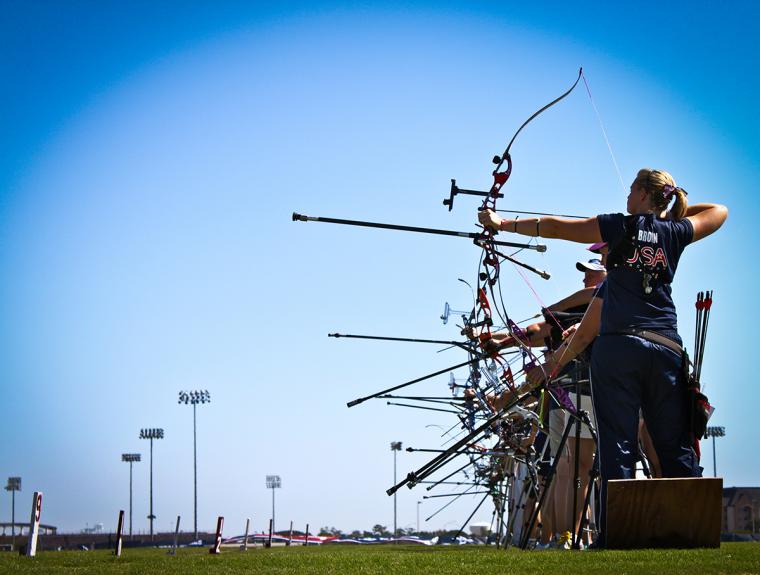

Before thinking about how to find the right photographer, gather a list of your event’s photographic needs, so you can have an informed discussion and get an accurate cost estimate. You’ll need to know:
- The confirmed date and location.
- The event schedule as it relates to photography. How far in advance will you want the photographer to arrive? Which divisions will compete, and when? Are there pre-event activities, or awards at the end, and do you want professional coverage for those?
- Does your sport allow, or prohibit, flash photography?
- What will photography access look like? If you’re hosting the event (but not organizing), you’ll want to check with the organizer about their rules for allowing photography.
- Are there any other sport rules that will affect how the event is photographed?
- Are you planning to offer portraits and/or prints as a paid service to athletes and their families onsite?
 Once you’ve gathered this info, it’s time to look for your photography partner. In general, a photographer with a background in photojournalism is going to be less focused on posing and more inclined to document action as it happens. If you’re looking at the images for marketing purposes, you may want to consider working with a general, sports or wedding photojournalist, who is going to be familiar with working under pressure, tight timelines, many different lighting conditions, and photographing moments as well as events and details. Here are a few resources to consider:
Once you’ve gathered this info, it’s time to look for your photography partner. In general, a photographer with a background in photojournalism is going to be less focused on posing and more inclined to document action as it happens. If you’re looking at the images for marketing purposes, you may want to consider working with a general, sports or wedding photojournalist, who is going to be familiar with working under pressure, tight timelines, many different lighting conditions, and photographing moments as well as events and details. Here are a few resources to consider:
•The National Press Photographers Association (NPPA)
•Professional Photographers of America (PPA)
•American Society of Media Photographers
Ideally, you’ll want to book your photographer as far in advance of your event as possible. Many photographers specialize in multiple areas (weddings, events, sports, portraits), and as such may book weekend events as far as 18 months in advance. However, even a few months ahead of your event, you should be able to find a good photographer with availability using the resources above. When you first contact a photographer, be prepared to send an inquiry via their website or social media; most photographers will respond within 24 hours. The more information you include in your initial inquiry, the better. Knowing how many hours of coverage are needed and how the photos will be used will help the photographer provide an accurate quote.
When meeting with photographers, there are a few important points to discuss:
- What is the photographer’s experience with sporting events?
- How comfortable is the photographer if flash cannot be used?
- How many images are usually delivered (per hour of coverage)?
- Will the photographer provide some images right away (24-48 hours) so you can share them on social media?
- What is the cost for coverage, and are the images included, or separate?
- Does the price include editing or retouching? If not, what are the charges?
- Does the price include an online gallery of images (or a USB)?
- Do you have full print rights, even for commercial purposes?
- Do you have online use rights, including social media?
- Will the images be watermarked?
- Are you expected to provide meals?
- How long are your photos available for download from your gallery?
- Is the photographer insured? Can they provide an insurance certificate?
- Does the photographer have a contract?
- When is payment expected, and what is the payment method?
 Some sporting events also hire photographers who can sell portraits to athletes and their families, even possibly producing prints onsite. If this is something you’re interested in offering at your event, there may be a fee split on portraits sold. This is specific to each event and photographer, but something you should be prepared to discuss if you’d like to offer this service to competitors. If so, you’ll not only want to see what the terms are for event coverage, but also terms and conditions for portrait offerings. Either way, be sure to review the photographer’s contract carefully, and discuss any points that may require negotiation.
Some sporting events also hire photographers who can sell portraits to athletes and their families, even possibly producing prints onsite. If this is something you’re interested in offering at your event, there may be a fee split on portraits sold. This is specific to each event and photographer, but something you should be prepared to discuss if you’d like to offer this service to competitors. If so, you’ll not only want to see what the terms are for event coverage, but also terms and conditions for portrait offerings. Either way, be sure to review the photographer’s contract carefully, and discuss any points that may require negotiation.
As the event draws near, there are a few important tasks: first, check in with your photographer to ensure they have a copy of the final schedule, and know where they’re expected to be and when — not only in terms of event arrival, but also during the event itself. A written timeline is a must for many photography jobs, and it’s important that there’s a written guide to what the photographer is expected to document, and when. Be sure to check in with any sanctioning organization to review photography rules. Identify areas that may need to be sectioned off for media access and review the rules with the photographer. You’ll want to communicate any guidelines regarding equipment, dress code, access areas and talking with athletes or officials during the event.
Finally, check in with your staff on the day of the event. You’ll want to be sure all officials are on the same page about photography guidelines and access areas, and whether photos can be taken during different parts of the event. As the event wraps up, you’ll want to have a clear understanding of photo delivery. Is the photographer providing a “sneak peek” of images right away? If so, how will they be shared with you? When can you expect the final images to arrive? And if final payment is due, be sure to take care of this when your photographer arrives onsite; forgetting to pay them in the excitement of the event can lead to delayed image delivery.
Speaking of finances, you might be wondering if professional photography is worth the expense, and the answer is a resounding YES. If you select the right photography partner, the return on investment should be significant. Your photographer won’t just travel to your event and show up to capture images; they’ll also select the best photos out of the hundreds or thousands they take, and edit them. There’s a lot of work that goes on behind the scenes to produce great event photographs, so as you decide to make the investment, remember that you’re paying for much more than a single day of work.
Here’s where people often ask why they can’t just have a “local college kid” take their photos or ask their friend who has a new digital camera. Fair question, but it should be a hard pass. First, liability: What if the photographer trips over a competitor or their equipment? What if their light stand falls on a spectator? A professional photographer will be insured, which is a requirement for many venues. Second, a pro is trained to document events. They’ve invested in top-of-the-line gear and education, know how to adjust camera settings even in the trickiest conditions, and how to capture a truly memorable shot.
The investment in photography can be budgeted for in advance; many event owners find that once they’ve hired a photographer, the resulting excitement around their event on social media is so significant that great images become a must-have for every event. You’ll be able to share digital albums with your stakeholders, improve ROI for sponsors, create awareness to drive registrations and ticket sales, and lend a professional appearance to the entire event. Ready to get started? Begin gathering your information and find a photographer near you! SDM

